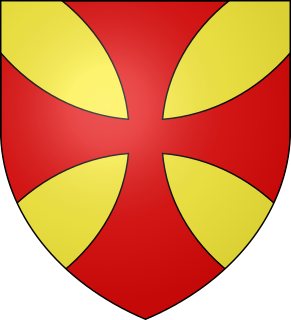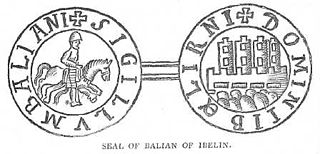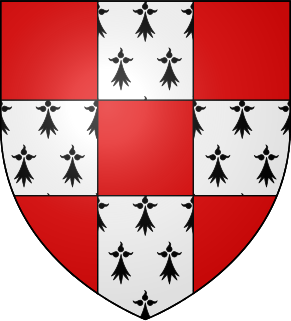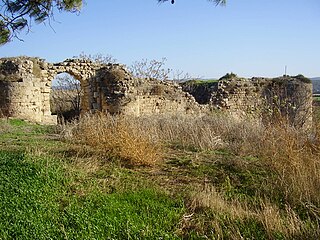Related Research Articles

Kingdom of Heaven is a 2005 epic historical drama film directed and produced by Ridley Scott and written by William Monahan. It stars Orlando Bloom, Eva Green, Ghassan Massoud, Jeremy Irons, David Thewlis, Brendan Gleeson, Iain Glen, Marton Csokas, Liam Neeson, Edward Norton, Michael Sheen, Velibor Topić and Alexander Siddig.
Hugh III of Cyprus, born Hugues de Poitiers, later Hugues de Lusignan, called the Great, was the King of Cyprus from 1267 and King of Jerusalem from 1268. He was the son of Henry of Antioch and Isabelle de Lusignan, the daughter of king Hugh I of Cyprus. He was a grandson of Bohemund IV of Antioch and thus a descendant of Robert Guiscard.

The Crusader state of the Kingdom of Jerusalem, created in 1099, was divided into a number of smaller seigneuries. According to the 13th-century jurist John of Ibelin, the four highest crown vassals in the kingdom proper were :

The House of Ibelin was a noble family in the Crusader Kingdom of Jerusalem in the 12th century. They rose from humble beginnings to become one of the most important families in the kingdom, holding various high offices and with extensive holdings in the Holy Land and Cyprus. The family disappeared after the fall of the Kingdom of Cyprus in the 15th century.

Barisan of Ibelin was an important figure in the crusader Kingdom of Jerusalem, and was the founder of the Ibelin family. His name was later written as "Balian" and he is sometimes known as Balian the Elder, Barisan the Old or Balian I. Barisan was lord of Ramla from 1138-1150.

Baldwin of Ibelin, also known as Baldwin II of Ramla, was an important noble of the Kingdom of Jerusalem in the 12th century and was lord of Ramla from 1169-1186. He was the second son of Barisan of Ibelin, and was the younger brother of Hugh of Ibelin and older brother of Balian of Ibelin. He first appears in the historical record as a witness to charters in 1148.

Balian of Ibelin, also known as Barisan the Younger, was a crusader noble of the Kingdom of Jerusalem in the 12th century. He was lord of Ibelin from 1170-1193. As the leader of the defense of the city during the siege of Jerusalem in 1187, he surrendered Jerusalem to Saladin on October 2, 1187.

John of Ibelin, called the Old Lord of Beirut, was a powerful crusader noble in the 13th century, one of the best known representatives of the influential Ibelin family. The son of Balian of Ibelin and Maria Comnena, Queen consort of Jerusalem, he had close ties with the nobility of both Cyprus and Jerusalem, since he was the half-brother of Queen Isabella I of Jerusalem. Before he was 20, he was appointed constable of Jerusalem, and a few years later became lord of Beirut, where he rebuilt the city after Saladin's conquest, and established the grand Ibelin family palace. He served as regent for two of his young relatives, Isabella's daughter Maria of Montferrat from 1205 to 1210, and then Henry I of Cyprus from 1228 until Henry came of age in 1232. John was known as a principled man, and was seen as the natural leader of the Christian barons in the Holy Land. He resisted the power-seeking of Frederick II, Holy Roman Emperor, in Cyprus, and opposed the imperial forces until Henry came of age.

John of Ibelin, count of Jaffa and Ascalon, was a noted jurist and the author of the longest legal treatise from the Kingdom of Jerusalem. He was the son of Philip of Ibelin, bailli of the Kingdom of Cyprus, and Alice of Montbéliard, and was the nephew of John of Ibelin, the "Old Lord of Beirut". To distinguish him from his uncle and other members of the Ibelin family named John, he is sometimes called John of Jaffa.

The Principality of Galilee was one of the four major seigneuries of the crusader Kingdom of Jerusalem, according to 13th-century commentator John of Ibelin. The direct holdings of the principality centred around Tiberias, in Galilee proper, but with all its vassals, the lordship covered all Galilee and southern Phoenicia. The independent Lordship of Sidon was located between Galilee's holdings. The principality also had its own vassals: the Lordships of Beirut, Nazareth, and Haifa.
The Lordship of Ramla was one of the Crusader vassal states of the Latin Kingdom of Jerusalem. It has been vassal to and part of the County of Jaffa and Ascalon.
The Kingdom of Cyprus, as an offshoot of the Kingdom of Jerusalem, maintained many of the same offices, such as: seneschal, constable, marshal, admiral, Chamberlain, and chancellor.

John of Ibelin was the Lord of Arsuf from 1236 and Constable of Jerusalem from 1251. He was a younger son of John I of Beirut. His elder brother, Balian, inherited Beirut. He served as regent of Jerusalem on two occasions: 1253–1254 for Conrad II and 1256–1258 for Conrad III. He was lieutenant for the regent on three occasions: 1247–1248 and 1249–1252 for Henry I of Cyprus and 1258 for Plaisance of Antioch.

Balian III of Beirut was the Lord of Beirut, the second of his family, from 1236, and a son of the famous "Old Lord" John of Ibelin, by his second wife Melisende of Arsuf. From his father he assumed the leadership of the nobility in the War of the Lombards, fought against the agents of the Emperor Frederick II.

Guy of Ibelin was marshal and constable of the kingdom of Cyprus. He was the fifth son of John of Ibelin, the Old Lord of Beirut, and of Melisende of Arsuf. He had close relations with the king of Cyprus, Henry I, acting as witness for two royal decrees; he was probably one of the king's executors named in a papal bull of Pope Alexander IV. With his brother Baldwin of Ibelin, he led the Cypriot crusaders in the siege of Damietta in 1248. According to the medieval chronicler Jean de Joinville, he was one of the most accomplished knights of his generation and a benevolent ruler on Cyprus. Joinville recounts an episode when he, Guy and Baldwin had been taken prisoner by saracen rebels:
I asked the lord Baldwin of Ibelin, who knew the saracen tongue well, what the men were saying. He answered that they were talking about cutting off our heads. Many men then made confession to a brother of the Holy Trinity, named John, belonging to the retinue of count William of Flanders. I could not think of a single sin. At the same time I was thinking that the more I defended myself the worse it would be. Then I crossed myself and knelt at the foot of a Saracen, who had a Danish axe in his hand, saying,"Thus was St Agnes killed." Guy of Ibelin, constable of Cypress, knelt beside me and made his confession to me. I answered him: "I grant you absolution by the power God has given me." But when I got up, I could not remember what he had said or told me.

Melisende was the hereditary Lady of Arsuf from 1177 and the second wife of the powerful nobleman John of Ibelin, the lord of Beirut (1179–1236), who led the opposition to Emperor Frederick II when he tried to impose his authority in the Kingdom of Jerusalem and the Kingdom of Cyprus.

Alice de la Roche, Lady of Beirut, Regent of Beirut was the wife of John II of Ibelin, Lord of Beirut, in the Kingdom of Jerusalem. She was a daughter of Guy I, Lord of Athens. Alice is sometimes referred to as Alice of Athens. Alice was Regent of Beirut for her daughter Queen Isabella of Cyprus, during the latter's absence in Cyprus.

Guy of Ibelin was the dominican bishop of Limassol, Cyprus from 27 April 1357 until his death. He belonged to the noble Cypriot house of Ibelin, closely linked by intermarriage with the kings of Cyprus. His father Balian of Ibelin, Lord of Arsuf, was a direct descendant of the first Balian of Ibelin, an important crusader. His mother, Margaret of Ibelin, continued to hold the title Lady of Arsuf after her husband's death. In the second half of the fourteenth century the fortunes of the house of Ibelin were in decline, as the once-powerful family became extinct. Guy's brother Philip became the last Ibelin to hold the title Lord of Arsuf. He was executed in Genoa in late 1373 for taking part in the assassination of King Peter I of Cyprus in 1369; King James I of Cyprus subsequently bestowed the title on John of Neviles, viscount of Nicosia, in 1389.

John was the Lord of Caesarea from 1229 and an important figure in the kingdoms of Cyprus and Jerusalem. He was the only son of Walter III of Caesarea and Marguerite d'Ibelin, daughter of Balian of Ibelin. He was often called "the young lord of Caesarea" throughout his life to distinguish him from his father, who had been called "the old lord of Caesarea".

Philip of Ibelin (1180-1227) was a leading nobleman of the Kingdom of Cyprus. As a younger son of Balian of Ibelin and the dowager queen Maria Komnene, he came from the high Crusader nobility of the Kingdom of Jerusalem.
References
- ↑ "GENEALOGY.EU" . Retrieved 2020-09-11.